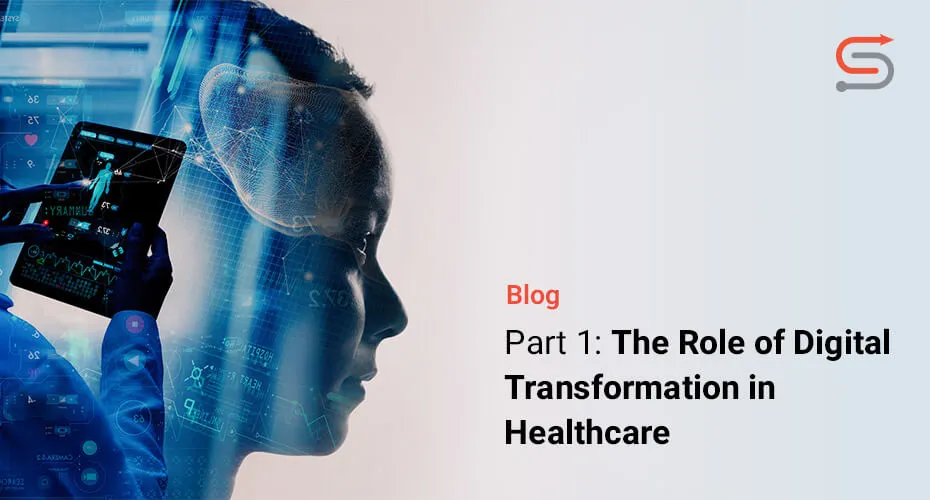September 26, 2023 - by Synoptek
So much has been said about digital transformation in the past few years. Yet, with new digital transformation trends constantly emerging and economic headwinds playing the spoiled sport, a lot is at stake! With every organization today operating on the pillars of modern technology, transformation has become inevitable.

But how do different industries approach digital transformation? What benefits does transformation offer to businesses in different sectors?
In a 3-part blog series, we will talk about the role digital transformation plays in different industries. In this 1st part, we are going to drive all our focus on the role of digital transformation in healthcare innovation.
The Current State of Digital Transformation in Healthcare
Almost every healthcare firm today understands the importance of digital transformation. According to reports, the global digital in the healthcare market is expected to grow from $65.2 billion in 2023 to $253.6 billion in 2033 at a CAGR of 14.5%. Yet, there are several roadblocks when it comes to actually investing in transformation.
- Overcoming the Fear of Moving Forward: For a sector relying on legacy EMRs and siloed healthcare systems, the fear of moving forward is immense. Embracing new ways of working and concerns over job loss due to automation often restrict healthcare organizations from bringing their digital vision to life.
- Data Protection and Privacy Policies: Healthcare organizations deal with extremely sensitive patient and healthcare data that needs to be protected 24/7. As data protection and privacy policies get increasingly stringent, many disdain themselves from moving their data or applications to the cloud.
- Software Integration Challenges: Most healthcare firms also struggle to introduce new technologies in their already complex tech ecosystems. The several software integration challenges make many averse to adopting a culture of transformation.
- Establishing New Processes: The changes that enterprise digital transformation will bring to their existing tools, processes, and ways of working are also concerning for many. Establishing new processes and introducing new policies is not something every healthcare firm is up for.
Benefits of Digital Transformation in Healthcare
In the healthcare sector, digital transformation is no longer just a buzzword. Timely and accurate healthcare delivery is increasingly dependent on technology. Whether through patient analytics or AI-based appointment scheduling, the benefits of digital transformation are many – for patients and organizations alike.
Top 6 Patient Benefits
1. Cost-Effective
Digital transformation in healthcare is extremely cost-effective for patients. Innovative apps and healthcare monitoring devices offer patients flexible and easy access to clinical care. They can get the medical assistance they need – virtually and from the comfort of their homes – without traveling to a hospital.
2. Improved Patient Experience
Healthcare organizations that embark on the transformation journey witness a massive improvement in patient experience. Unified systems, advanced analytics, and intelligent scheduling help streamline previous pain points. For instance, in-room entertainment makes the hospital experience more enjoyable for patients. At the same time, secure direct messaging makes it easy for patients to get immediate responses from caretakers.
3. Better Security for Medical Data
Digital transformation doesn’t just improve patient satisfaction. It also goes a long way in securing sensitive patient data. Modern systems offer high levels of encryption to safeguard data 24/7. Strong access control measures ensure only authorized caretakers can access personally identifiable patient or medical information. At the same time, with the right disaster recovery infrastructure in place, hospitals can ensure that data lost due to an outage or downtime is recovered securely and in time.
4. Seamless Patient Journey
Investing in innovative digital technologies is also a great way to streamline the patient journey. Tapping into the power of the cloud, IoT, and analytics technologies offers a great opportunity to provide seamless patient journeys and improve clinical outcomes. Healthcare providers can use these technologies to create a unified view of patients across multiple platforms and providers. Such insight helps in making effective data-driven healthcare decisions across the patient lifecycle.
5. Better Communication
Digitally transformed healthcare firms communicate better with patients. Using modern digital tools, patients can easily and quickly reach out to caretakers. For example, AI-based chatbots can allow patients to voice their healthcare concerns, follow up with doctors, and receive an immediate response. Similarly, intelligent interactive voice responses can enable patients to speak to live agents and get answers to healthcare queries immediately.
6. Predictive Healthcare
Implementing digital technologies in the care continuum paves the way for predictive healthcare. Using AI and machine learning tools, patients can receive health alerts on their fitness or mobile devices. This data can automatically also be shared with doctors, allowing them to take immediate medical action.
Top 6 Healthcare Industry Benefits
1. Reliable Service Delivery
Digital technologies empower healthcare organizations with the capabilities they need to improve healthcare service delivery. Using technologies like analytics and AI, doctors can more effectively process patient information and make more accurate diagnoses. They can also leverage telehealth capabilities to improve patient communication and analysis and ensure better healthcare decisions.
2. Enhanced Collaboration
Modern technology tools and systems offer a great medium to enhance collaboration between healthcare professionals. Instead of siloed, one-on-one calls, teams can communicate and collaborate centrally. Using a unified EHR system, they can feed the necessary patient and research data into a single tool and discuss possible treatment options in real-time.
3. Easily Accessible Medical Records
Healthcare organizations that embark on the digital journey no longer have to search for important patient information across siloed reports, hard disks, or handwritten prescriptions. With all critical data continuously fed into a centralized repository, medical records are easily and securely accessible – to authorized personnel.
4. Seamless Appointment Scheduling
Digital technologies also make it easy for doctors and caretakers to schedule appointments seamlessly. Intelligent tools and apps help streamline patient appointments, optimize workflows, and provide a better overall experience to patients. They help overcome long waiting times, poor communication, and inadequate use of resources – empowering healthcare professionals to provide the best care in the shortest time.
5. Instant Updates
Healthcare organizations that are digitally sound are in a better position to get instant updates on health metrics. Using automated tools and AI-based apps, doctors can stay up-to-date with the latest health conditions. From how a particular medication works for a patient to the number of patients in the ICU, bed utilization rate, and more. Such metrics make it easy for organizations to make better scheduling, appointment, and care decisions.
6. Supply Chain Management
With the right technologies in place, supply chain management also becomes easy. Data analytics and AI can help minimize supply chain errors while placing orders for new supplies. Using smart technology, hospitals can efficiently track their medical inventory and intelligently place orders to reduce wastage. They can use radio frequency tags to track high-value equipment throughout their lifecycle and order replacements promptly.
Top Digital Transformation Trends in Healthcare
Digital transformation has become inevitable for the healthcare industry. If you are looking to make the most of modern technologies, here are some trends to watch out for:
1. Big Data Analytics
In the coming years, big data analytics will continue to be a huge trend in the healthcare sector, becoming a $67.82 billion market by 2025. From effective treatment decisions to improved staffing, better risk and disease management, to better healthcare security and compliance. Big data analytics will help healthcare organizations predict and resolve problems and improve overall care outcomes.
2. Artificial Intelligence (AI)
Advancements in AI are set to change the face of healthcare, making it a $28 billion market by 2025. More and more healthcare organizations will leverage AI to analyze complex medical images and unearth critical insights into patients’ conditions. The technology will also be extensively used to proactively detect healthcare anomalies, improve patient communication via chatbots, and enable efficient drug discovery.
3. Wearable Devices
Wearable healthcare devices have been around for a while and will continue to make the healthcare experience seamless. With the wearables market expected to grow at a CAGR of 6.7%, several vendors will be seen introducing new capabilities like wearables, voice-based assistants, biosensors, and more.
4. On-Demand Care
As patients get increasingly involved in their personal health and well-being, on-demand care will become a big trend in the coming years. AI-enabled healthcare models will ensure the availability of virtual doctors 24/7. Patients can schedule sessions with doctors within minutes for various conditions – from mental well-being to cold and flu, skincare conditions to allergies, and more.
5. Blockchain
The global blockchain technology market size was valued at $10.02 billion in 2022 and is expected to grow at a CAGR of 87.7% from 2023 to 2030. As healthcare gets increasingly delivered through the cloud, blockchain will allow for better data security, privacy, and accessibility. The technology will also enable health information systems to work seamlessly within and across organizational boundaries and advance healthcare delivery for individuals and communities.
6. Augmented Reality (AR) and Virtual Reality (VR)
The healthcare AR and VR market is expected to be worth $4.64 billion. The technologies will assist caretakers in delivering better treatments and outcomes. They will help improve surgical efficiency by allowing doctors to explore different organs virtually. The technologies will also be increasingly used to improve physical therapy treatments and memory and cognitive functions.
Driving Transformation in Healthcare Services
As the healthcare industry struggles to improve patient experience and drive growth, the business benefits of digital transformation are many. From improving patient diagnoses to enhancing security, optimizing supply chain management to improving communication – there is so much healthcare organizations can achieve by digitally transforming themselves.
In the 2nd part of this 3-part series, we will take you through the role digital transformation plays in financial innovation. Stay tuned!





